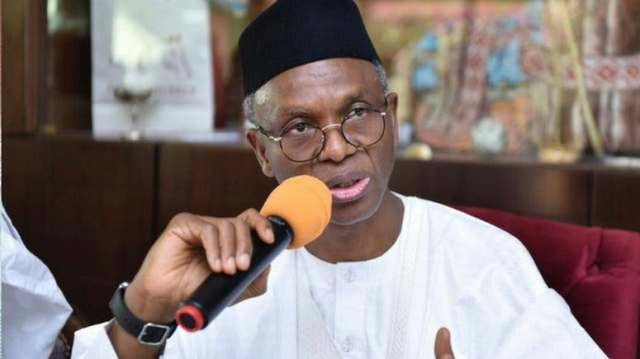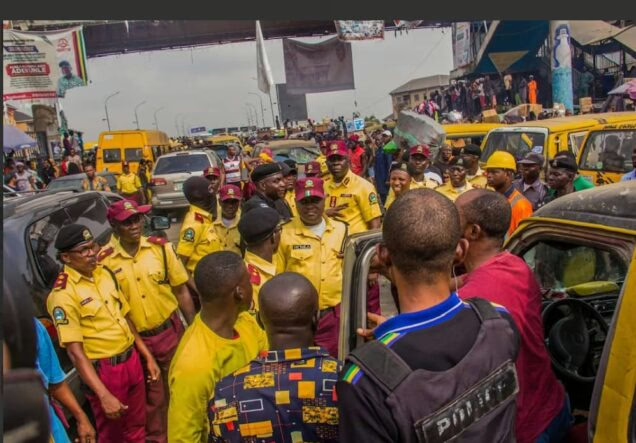Long queues at different fuel stations have become persistent in most states due to petrol scarcity.
Oil marketers under the aegis of the Independent Petroleum Marketers Association of Nigeria alluded to the problems in the downstream sector with a prediction that the current scarcity would not end until the government gave a clear position on subsidy removal, full deregulation and price determination.
The marketers had also refuted the Federal Government’s claim that it didn’t increase the pump price of petrol. The Nigerian National Petroleum Corporation Limited enjoys an import monopoly of petrol into the country.
Buyers, however, turned to black market sellers who sold a litre of fuel between N200 and N250 against the approved pump price per litre of N165.
Subsidy payments reflecting humongous amount ridden in corruption and non-accountability are part of the problems in the oil sector.
Our correspondent who went round the town to speak with motorists and commuters noted that the situation was becoming unbearable. A commercial bus driver, Richard Ijie, who plies Agege Underbridge to Alausa, Lagos State, complained that the fuel scarcity had made driving a difficult job for them as they struggled to get fuel for their buses.
He stated that the current situation forced them to increase transport fares from the initial N150 to N200, adding that the development was greeted with protests from passengers.
He said, “The truth is that the fuel scarcity is biting harder and harder every day. What we see every day is long queues everywhere and the prices are not the same at filling stations. Some sell at N300, N250, N280 and even N185. It depends on the fuel station. I ply Agege underbridge to Alausa and I charge each passenger N200. Before, it was N150 but the hike in the oil pump price also forced us to increase the fares. Though passengers complain every day, there is nothing we can do about it because we buy fuel at a high cost and we need to make profit. We have to add a little amount to the old fare.’’
He added that most of their passengers who were government workers often complained that they expended more on transportation to their workplaces amid non-salary increments.
Ijie appealed to the Federal Government to work on how the nation’s four refineries could be efficient to refine crude oil locally, rather than reining crude abroad. He noted that local crude refining would yield more productivity and tackle the perennial fuel scarcity in Nigeria.
He added, “Some passengers even beg for free rides but we cannot do that because we also spend a lot on fuel. If the Federal Government wants to remove fuel subsidy, they should do it at once because people are paying the fares they are not supposed to pay. If our refineries are working, I don’t think we will be buying fuel at the amount we do. They should work on our refineries or privatise them for things to change. I am always worried whenever the fuel is low because of the stress of buying more. The fuel stations are not selling. The ones selling are not cheap at all and the queue is exhausting.’’
Also, a minibus bus driver, Goddey Ogana, plying Omole to Agege Pen Cinema, said he used to make a daily profit of N7,000, stating that since the scarcity started a few weeks back, his profit had dropped considerably.
He complained that it was difficult to cope with the situation as he spent most of his proceeds on the petrol which he said he had no choice than to buy between N280 and N300 per litre.
He also lamented the hours wasted in queues at various fuel stations, saying it was energy-sapping.
He said, “Some are selling a litre of petrol for between N280 and N300 and the hours we spend in the queue is laborious. There are times we would be in the queue for four or five hours and at the end of the day nothing we would not get fuel to buy. If one takes N2,000 or N3,000 to a fuel station now, the quantity of petrol one will buy if available will not be much. I drive a minibus and regularly ply Agege Pen Cinema to Omole. Before, the fare was N100 per passenger but with the current situation, it is now N150. Initially, we increased it to N200 but complaints from passengers were much so we reduced it to N150 though the N50 added is nothing for us because it doesn’t make any difference. The amount we spend on fuel has eaten our profits. Sometimes, when returning from Omole to Agege, we charge passengers at N50 but such a period has passed.’’
The native of Cross River State lamented that unlike before when he would have made over N5,000 profit as of 2pm, he had yet to make a profit of N3,000.
He stated, “Earlier today (Thursday), I bought petrol for N280 per litre and since then I have been struggling to make a profit of N3,000. Because of the situation, we stopped being sympathetic to passengers when they beg for a free ride. We are also spending hugely on fuel. I don’t know why we are suffering to get it.
“The problem the drivers are facing now is that some passengers prefer to trek to a certain distance so that the amount they will spend for transportation will reduce. Some of them prefer to start their trekking as early as 5am so that they can beat their resumption time. The effect of this is that the drivers stay for a long period of time before filling the buses and it affects our daily income compared to when there was fuel. I used to make as much as N7, 000 daily after paying the necessary dues but the situation has changed.’’
Our correspondents observed private vehicle owners, motorcycle riders, commercial drivers and individuals with different sizes of kegs struggling in several long queues for fuel at a popular fuel station in Abule-Egba area of Lagos State. The situation however caused the blocking of a section of the road leading to the fuel station as other vehicles and passers-by forced their way through the route.
Also speaking to our correspondent, a tricycle rider, Olorungbebemi Oluwaseun, said he was forced by the situation to devise a strategy for his working hours. He noted that to be at an advantage over his colleagues he often resumed at Agege Underbridge as early as 6:30am daily to take early morning passengers to their various destinations.
The man in his earlier thirties added that rather than wasting hours in long queues at fuel stations, he would ask a hunting colleague to also get for him, while he continued with his business.
Oluwaseun stated, “I drive a tricycle from Agege underbridge to Acme road. Before we charged N100 but now we charge N200 and we also charge N300 during rushing hours. As for me , I know that going to filling stations to buy fuel will affect my work because I will have to stay in the queue for hours so what I do is that when any of my colleagues here is about to go on a hunt for fuel, I will send him to get it for me too. We are facing a lot this time around because of this fuel issue. I start work by 6:30am every day to beat my other colleagues who are always not out yet at that time so that I can get more passengers and earn more otherwise I’ll have to stay in the queue for a long time before it reaches my turn when everyone is out.”
He further noted that because of the nationwide fuel scarcity, some of the stations have adjusted their time of operation, adding that some of them now opened their stations around 10am before selling to customers later in the evening.
He stated that the development made people join the queue for hours while anticipating that sooner or later the fuel stations would start selling the fuel to customers.
He added, “What some of the filling stations are also doing now is that they start operation by 10am and that is at a disadvantage to our business too. By that time, workers who are mostly our passengers will have resumed at their various workplaces and we will have no other choice than to struggle for passengers. At times to get fuel requires one to bribe or else some of the attendants otherwise one will waste his time and eventually go empty-handed. We are facing is really a big deal especially for drivers and others who directly depend on fuel for their means of livelihood. Sincerely, the situation is really tough. It is what we buy that we also sell but some of these passengers do not want to understand us and we cannot do what will affect us too. Most of the money we realise every day is consumed by the amount we spend on fuel. Government should help on the matter. They should remember that whatever they do today, tomorrow shall tell. If we continue suffering like this and nothing is done about it, I believe posterity will surely judge.”
A minibus operator, Jimoh Rafiu said before the scarcity of fuel, he used to charge N300 from Agege to Sango-tollgate but after a consensus was reached by the drivers the amount was changed to N400, while passengers had to pay N500 in the evening.
He said, “I drive a minibus and I ply Sango-Tollgate to Agege. I used to charge N300 from Sango to Agege but I now charge N400 in the morning for each passenger. Starting from 4pm, we always ask passengers to pay N500 to Agege. This is where we find ourselves. Despite the amount we added on the fares, the profit we make on a daily basis is not comparable to the previous ones.”
He stated further that the effects of the scarcity and increase in pump price could be seen on the increasing prices of food items.
“You cannot expect us to buy petrol at a frustrating amount and still charge the same transport fares. Everybody is complaining and the prices of food items are also increasing. Everything in this country is affected by the fuel scarcity and there is nothing we can do about it unless our government is ready to find a lasting solution to it,” he said.
He explained that passengers who went to the roadsides for buses to bypass higher fares charged at motor parks were vulnerable to criminals who might capitalise on the current situation to disguise themselves as commercial drivers and perpetrate crimes. He noted that the increasing amount motorists were spending on fuel and costs of vehicle maintenance were becoming frustrating.
He said, “This fuel scarcity will give criminals the opportunity to perpetrate evil deeds. They will know that more passengers are no longer taking vehicles at garages and motor parks because of huge fares. Some prefer to enter buses by the roadside where it will be cheaper. Government should also work on the refineries. Many people have stopped driving commercial buses when they can no longer cope with the amount they spent on fuel and other vehicle maintenance. There is nothing bad in it if our government does the right thing.”
However, the situation was different at Oshodi as commercial drivers, who were in a haste to convey their passengers to their destinations did not bother to join the queue as they looked for stations with fewer people despite the exorbitant pump price.
A conductor of an 18-seater Hiace bus who identified himself as only as Bjay told our correspondent that commercial drivers especially were now careful of the kind of fuel they put into their vehicles, alleging that some fuel stations were seizing the opportunity of fuel scarcity to sell adulterated products to unsuspecting customers.
He said, “We (drivers) don’t just stop at any filling station because some of them are now selling adulterated petrol. One will not know because they don’t sell it to people using kegs or other containers. They only sell for vehicle owners so that it won’t be easy for them to know. That type of petrol or diesel can spoil the engine and that’s why my boss decided to only patronise some specific sellers.”
Also speaking, an 18-seater commercial bus driver, Olanrewaju Mahmoud, condemned the situation, saying it was a sign that the government would soon remove subsidy on fuel.
He said most of the time he sent some of his relatives living in neighbouring states to help him buy 10 litres of petrol and he would later collect it because of the crowds at different fuel stations in Lagos State.
He said, “I don’t stress myself anymore about fuel. Once I need petrol for my bus, I just send some money to my people in either Ogun State or Ibadan and they will get it from them. After buying it, they will call me and I can go there anytime I want. It is not as if fuel is not scarce in those places too but most of the people I send money to have time unlike me that join fuel queues most times.”
Our correspondent further observed that the transport fare from Ijaiye to Agege, which was formerly N200, had been increased to N300 by tricyclists and commercial bus drivers. Likewise, fare from Ijaiye to Oshodi which used to be N400 was hiked to N600.
At Ojodu-Berger, buses travelling to Ibadan now charge N,1500 from N800, while passengers going to Mowe, Ogun State, had to pay N700 from the initial N300.
Most passengers who spoke with lamented the hike in transport fares.
One of the commuters, Umar Usman, told our correspondent that there was little or nothing passengers could do about the increased fares.
On his part, another commuter in Agege who identified himself only as Omo Pastor, noted that the fuel scarcity and increase in transport fares were making passengers spend more than their budget capacity.
“It is funny that in this country we are still suffering. The money we spend on transportation to our workplace every day is more than the amount of money we earn monthly. Government should find a solution to this problem,” he said.
Also, a trader, Precious Jeremiah, complained that she often spends hours at bus stops waiting for buses that would at least reduce fare to her destination.
Contacted for his comment on the issue, the spokesperson for the Major Oil Marketers Association of Nigeria, Oliseh Wakwe, sent a statement to our correspondent, which indicated that the energy-sapping queues were caused by exceptional high demand and bottlenecks in the fuel distribution chain. Wakwe added that high costs of logistics and exchange rates continued to put pressure on oil pump prices.
The statement further noted that the challenges of fuel scarcity and pump price hike could be tackled with full deregulation of the petroleum downstream sector to encourage liberalisation of supply and long-term investments in distribution assets.
The statement read in part, “The major cause is the shortage and high US dollar costs of vessels for ferrying products from mother vessels to depots along the coast. Next is the inadequate number of trucks to meet the demand t o deliver products from depots to filling stations nationwide. These high logistics and exchange rate costs continue to put pressure on prices at the pump. Companies have worked diligently at depots and filling stations to relieve the stress faced by customers. Our members have again agreed to extend depot loading hours as well as keep strategically situated service stations open for longer hours to ease access to fuels for our customers.’’
It added that MOMAN would continue to use its best endeavours to ensure sale of product at the pump prices currently approved by the regulatory authorities, despite pressure on price by demand and costs in the immediate operating environment.











